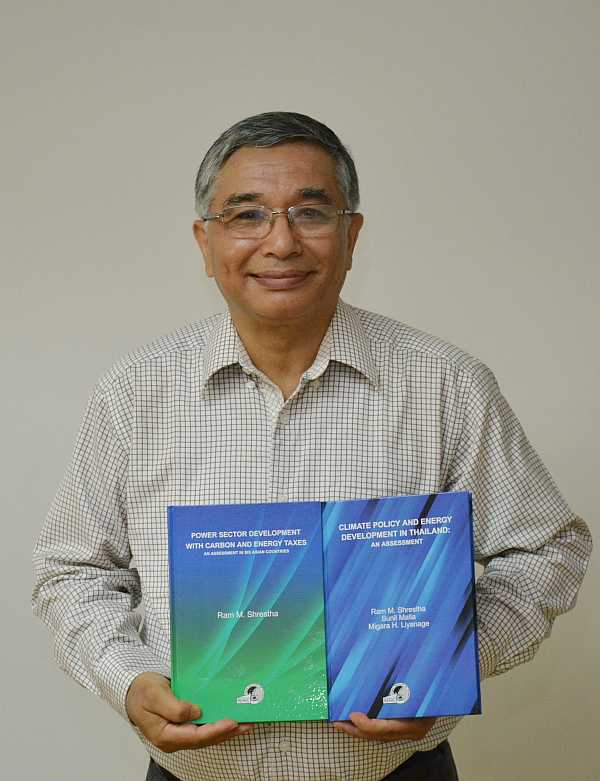Prof. Shrestha, who has spearheaded research work that led to these
publications, remarked: “Each books represents a decade’s worth of work
done at AIT.”
The book on “Climate Policy and Energy Development in
Thailand”, which is authored by Prof. Shrestha along with two
AIT researchers Sunil Malla and Migara H Liyanage, employs advanced
quantitative modelling tools for energy systems and climate policy
modelling. The book acquires an increased significance in light of the
recent climate change agreement in Paris, where countries submitted
their Intended Nationally Determined Contributions (INDCs) to reduce
emission of Greenhouse Gases (GHGs). While climate and energy policies
are closely related, in many situations, energy policies are introduced
with purely national considerations like economic growth, energy
security and local and regional environmental quality. However,
sustainable energy policies can contribute to both GHG emission
mitigation and attainment of national policy objectives.
The 230-page publication covers a wide variety of topics including the
socioeconomic, energy and environmental emission trends in Thailand,
Thailand Asia Pacific Integrated Model (AIM) Enduse Model, Energy
development and environmental implications in the
business-as-usual scenario, scenario-based analyses of energy
system development and its environmental implications in Thailand,
multi-gas emissions in Thailand, implications of post-Kyoto carbon
dioxide emission reduction targets on energy and environment in
Thailand, energy and environmental implications of using biofuels in
Thailand’s road transport, co-benefits of carbon dioxide reduction in a
developing country, and Thailand’s low-carbon scenario 2050.
The second book on “Power Sector Development with Carbon and
Energy Taxes” presents country-specific analysis of the
effects of carbon and energy taxes on the power sector in China, India,
Indonesia, Sri Lanka, Thailand and Vietnam. Each country study analyzes
the implications of carbon and energy taxes on technology options,
energy resources mix, and investment requirements from a long-term
planning perspective. The 252-page book also assesses the impact of
taxes on carbon emissions and local and regional pollutants from the
power sector. “The quantitative insights on the effects of carbon and
energy taxes on power sector development will be useful to policy
makers and researchers,” Prof. Shrestha added.
A part of the research included in this volume was conducted under the
Asian Regional Research Programme in Energy, Environment and Climate
(ARRPEEC) funded by the Swedish International Development Cooperation
Agency (SIDA) and was coordinated by AIT.
Both publications have been brought out by RERIC, AIT
Details of both publications can be found at these links:
Climate Policy and Energy Development in
Thailand: An Assessment
Power Sector Development with Carbon and Energy
Taxes: As Assessment in Six Asian Countries
Publications by AIT authors can be found at BookShelf: https://oldweb.ait.ac.th/news-and-events/bookshelf

